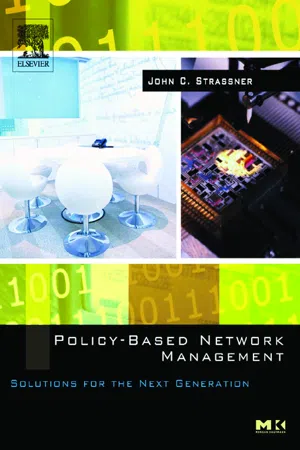
- 516 pages
- English
- PDF
- Available on iOS & Android
eBook - PDF
About this book
Policy-Based Network Management (PBNM) systems enable business rules and procedures to be translated into policies that configure and control the network and its services. Those who manage network systems are aware that this approach can benefit both network management as well as the development of applications that use network services; however, the details surrounding these systems has been obscured by marketing hype, numerous acronyms, and theoretical complexities. Policy-Based Network Management: Solutions for the Next Generation cuts through the hype surrounding PBNM and makes it approachable for those who really need to understand what it has to offer. The author, founder of the IETF Policy Framework working group, discusses system requirements, information models, and system components for Policy-Based Management. He also provide practitioners with a resource for developing and/or incorporating PBNM systems. As network systems become larger and more complex, creating policies for them has become a crucial step in the management of network systems, and this book is a welcome addition to this exciting approach.
- Presents a completely new approach to PBNM that unites the business, system, and implementation spheres
- As the basis for examples and discussion, uses the DEN-ng information model, an easy-to-understand open standard tied closely to eTOM and NGOSS
- Introduces the Ponder system, then examines Ponder extensions designed to enhance the structure of high-level policies and their application in a PBNM system
- Filled with examples illustrating how policies are most effectively used in a PBNM system and what new directions PBNM is likely to take
Tools to learn more effectively

Saving Books

Keyword Search

Annotating Text

Listen to it instead
Information
Table of contents
- Front Cover
- Policy-Based Network Management
- Copyright Page
- Contents
- Chapter 1. The Foundation of Policy Management
- Chapter 2. Policy Management Fundamentals
- Chapter 3. Policy Management and the Sharing of Data
- Chapter 4. Policy Operation in a PBNM System
- Chapter 5. Representing High-Level Policies
- Chapter 6. Motivation for the DEN-ng Policy Model
- Chapter 7. The DEN-ng Policy Model
- Chapter 8. Components of a PBNM System
- Chapter 9. Examples of Using the Policy Continuum
- Chapter 10. Application of PBNM Concepts
- Chapter 11. New Directions in Policy-Based Management
- Appendix 1. Guide to UML
- Appendix 2. Comments on Non-Essential Policy Terminology from RFC3198
- Index
Frequently asked questions
Yes, you can cancel anytime from the Subscription tab in your account settings on the Perlego website. Your subscription will stay active until the end of your current billing period. Learn how to cancel your subscription
No, books cannot be downloaded as external files, such as PDFs, for use outside of Perlego. However, you can download books within the Perlego app for offline reading on mobile or tablet. Learn how to download books offline
Perlego offers two plans: Essential and Complete
- Essential is ideal for learners and professionals who enjoy exploring a wide range of subjects. Access the Essential Library with 800,000+ trusted titles and best-sellers across business, personal growth, and the humanities. Includes unlimited reading time and Standard Read Aloud voice.
- Complete: Perfect for advanced learners and researchers needing full, unrestricted access. Unlock 1.4M+ books across hundreds of subjects, including academic and specialized titles. The Complete Plan also includes advanced features like Premium Read Aloud and Research Assistant.
We are an online textbook subscription service, where you can get access to an entire online library for less than the price of a single book per month. With over 1 million books across 990+ topics, we’ve got you covered! Learn about our mission
Look out for the read-aloud symbol on your next book to see if you can listen to it. The read-aloud tool reads text aloud for you, highlighting the text as it is being read. You can pause it, speed it up and slow it down. Learn more about Read Aloud
Yes! You can use the Perlego app on both iOS and Android devices to read anytime, anywhere — even offline. Perfect for commutes or when you’re on the go.
Please note we cannot support devices running on iOS 13 and Android 7 or earlier. Learn more about using the app
Please note we cannot support devices running on iOS 13 and Android 7 or earlier. Learn more about using the app
Yes, you can access Policy-Based Network Management by John Strassner in PDF and/or ePUB format, as well as other popular books in Computer Science & Computer Networking. We have over one million books available in our catalogue for you to explore.